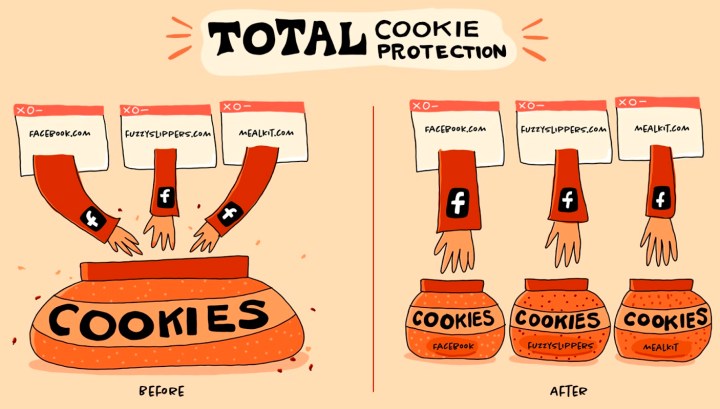Mozilla Firefox has just made changes to its browser, making an existing feature available by default to all users. The tool is called Total Cookie Protection, and thanks to it, Firefox now calls itself “the most private and secure major browser available across Windows, Mac, and Linux.”
Whether Firefox is really the best browser remains to be seen, but Total Cookie Protection certainly kicks things up a notch where privacy is concerned. Will it be enough to help Firefox pull ahead of the competition?

Firefox’s Total Cookie Protection tool is not exactly a new feature. It was first introduced in 2021, but it was never on by default — you had to toggle it on manually in order for it to work. Alternatively, using Firefox in privacy mode enabled the feature as well. As a result, many users may have been unaware of its existence, but now Firefox has rolled it out to all users of the browsers, making sure it’s always on without needing to tweak the settings.
The illustration above does an excellent job of portraying what it is that Firefox’s new pride and joy delivers to the users. Total Cookie Protection locks the browser cookies only to the site that created them as opposed to letting them follow you around the web.
Cookies are often used as a means of preparing targeted ads across many websites. This is why, as an example, if you’re shopping for clothes online, you’ll then see ads from the retailer you just browsed. Those ads will follow you to completely unrelated corners of the internet, reminding you of that one time you looked at that one website. With Firefox’s new tool, this could be largely reduced.
Firefox described the way the tool works in a very approachable way. Total Cookie Protection essentially creates a separate “jar” for each website’s cookies. Without the feature, your browser cookies all sit in one big shared jar that every website can peek into and gather information about your browsing habits. Firefox makes it so that each website can only learn about what you’re doing within the boundaries of its own pages. The cookies remain safely locked, and each site can draw from its own jar, but it has no access to any of the other jars.
As Mozilla said in its blog post, “It’s an alarming reality — the possibility that your every move online is being watched, tracked, and shared. […] No other websites can reach into the cookie jars that don’t belong to them and find out what the other websites’ cookies know about you — giving you freedom from invasive ads and reducing the amount of information companies gather about you.”

Total Cookie Protection still lets third-party cookies provide accurate analytics, which is something that websites certainly need, if only to provide the kind of content that the users want to see. However, it should eliminate the possibility of those cookies tracking your activity from all around the web.
Mozilla Firefox has emphasized privacy and security for quite some time, rolling out Enhanced Tracking Protection for all users in 2019. Despite the security provided by the browser, it still lags behind its competition. According to Statcounter, Google Chrome is the absolute king of the browsers, with a 64.95% market share as of May 2022. This is followed by Safari with 19%, Microsoft Edge with 3.99%, and finally, Firefox with 3.26%, marking a drop from the previous year.
Beating Google Chrome might be near-impossible for Firefox, but Total Cookie Protection should certainly help it draw in some new users. If you’re tired of seeing invasive ads all around the web, download the latest version of Firefox and give it a try.
Editors' Recommendations
- Here’s why I finally gave up on using Safari on my Mac
- Google has a great idea to fix your tab chaos in Chrome
- This Google Chrome feature may save you from malware
- Firefox just got a great new way to protect your privacy
- Google may have just fixed Chrome’s most annoying problem




